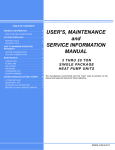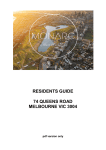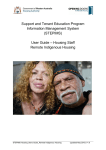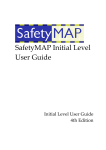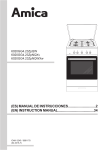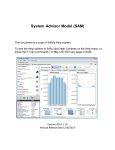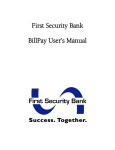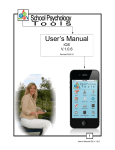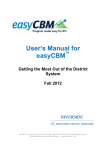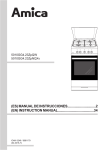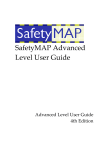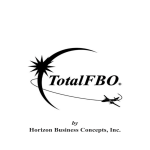Download Tenant Handbook - Defence Housing Australia
Transcript
Tenant Handbook www.dha.gov.au Defence Housing Australia (DHA) welcomes you and your family The information in this handbook has been prepared to help you with all aspects of your tenancy. It provides advice and information on your responsibilities as a tenant and DHA’s role as a provider of housing and related services. While every care has been taken in compiling the information contained within this handbook, information may be subject to change in accordance with policy documentation. T his handbook will come in handy throughout your tenancy. We ask that you keep this for your information. TENANT HANDBOOK 1 2 TENANT HANDBOOK Contents Chapter 1 About Defence Housing Australia 4 Chapter 2 Moving into your Service Residence 6 Welcome visit Organising your utilities Keys Caring for pets Modifying your Service Residence Group Rent Scheme (GRS) contribution 6 8 9 10 11 12 Chapter 3 Living in your Service Residence 14 Your tenancy Insurance Owners Corporation or similar group title properties Operating a business Disturbance to neighbours or nearby residents Inspections Maintaining your property Reporting maintenance problems 14 16 16 17 17 17 18 22 Chapter 4 Vacating your Service Residence 24 Reasons for vacating Pre-Vacation Inspection Cleaning standards required when vacating Before you vacate Complaint resolution Paying a debt to Defence 24 24 29 32 33 34 Chapter 5 Other information 36 Keeping you up to date Handy contacts Cleaning checklist 36 38 39 TENANT HANDBOOK 3 Chapter 1 About Defence Housing Australia DHA was established in 1988 with the aim of improving the quality and selection of housing for Defence members and their families. We manage approximately 18,000 properties around Australia and support you and your family throughout your tenancy. Our services include: >> assisting members and their families in finding their next housing solution >> managing and maintaining housing for Defence members and their families within Australia >> administering the allowance for Defence members occupying rental accommodation >> managing our online housing tool – HomeFind >> constructing and acquiring properties to meet the housing demands of the Australian Defence Force >> redeveloping properties to ensure they continue to meet the required standard, and >> managing the Sale and Leaseback program for investors. Housing Management Centres – support for your family DHA has Housing Management Centres (HMC) across Australia which enables us to provide effective support wherever you need it. You will have dedicated staff members available to help you and your family throughout your tenancy. Our Housing Consultants are skilled in HomeFind, our online housing tool, and can also administer and provide advice on Rent Allowance. Our Property Managers can help you with any concerns relating to your property or tenancy. At the end of your tenancy, your Property Manager will also help you in preparing to vacate your Service Residence. Phone 139 DHA (139 342) www.dha.gov.au 4 TENANT HANDBOOK Defence Housing Australia providing housing and related services for Defence families. Allocations > Tenancy ONLINE SERVICES Maintenance Investment Customer Service Rent ALLOWANCE Special Needs REDEVELOPMENT Construction TENANT HANDBOOK 5 Chapter 2 Moving into your Service Residence Welcome visit Your Property Manager will meet you at your Service Residence and provide you with information about the property. Your welcome visit checklist At your welcome visit, your Property Manager will take you through the following items. Please take this opportunity to raise any concerns you may have. Outline key information relating to your tenancy This handbook provides you with key information to help you throughout your tenancy. Sign the DHA Residence Agreement The DHA Residence Agreement (DRA) acknowledges the conditions of occupancy. It is a legally binding contract between the Commonwealth and the Defence member and sets out your rights and obligations as a Defence tenant. Annexure A to the DRA defines certain responsibilities in regards to fair wear-and-tear and non-fair wear-and-tear damage that may occur. Keys to your property On signing the agreement, you will be given two sets of keys to the property. Condition Report You will be stepped through the Condition Report for the property. This will provide you with an opportunity to discuss the condition and features of the property along with any outstanding maintenance. NOTE: There may be some instances of fair-wear-and-tear that are considered too minor to require repair work. More information about wear-andtear can be found on page 19. You will be given 14 days from your welcome visit, to identify and note on your condition report, any items that may have been overlooked. Once completed, please return the condition report to your local HMC. Please take the opportunity to raise any concerns about your new residence with your Property Manager during the welcome visit. 6 TENANT HANDBOOK TENANT HANDBOOK 7 Organising your utilities Connections and payment of utilities You are responsible for the opening and payment of any electricity, gas, telephone or internet accounts. In some instances there may be a connection fee. DHA will provide a telephone line, however handsets, if not in the property, can be purchased or rented from a telecommunications supplier at your own expense. When connecting these services, you may need to provide a copy of your DRA as confirmation of your new address. On-base properties may use gas and electricity supplied from the Defence establishment; the billing process for these utilities will be provided through Defence. For further information please contact your Property Manager or your Defence Relocations Housing Manager (DRHM). Fast Connect Fast Connect is a quick, hassle-free way to have your telephone, electricity, internet, and gas services connected and disconnected. Fast Connect can also offer connection or disconnection of pay television once approved by your local HMC. This is a free service for Defence members and provides you with a choice of service providers. A Fast Connect authority form is available online (www.fastconnect.net.au). For more information call 1300 661 464 or visit the Fast Connect website. NOTE: Temporary accommodation will not be extended if connections have not been arranged in time. Pay television An application form to connect pay television, where this service is available can be found in your welcome kit, on our website (www.dha.gov.au) or obtained from your local HMC. You must return the form to your local HMC for approval before connecting this service. If your residence is part of an owners’ corporation or group development, you may also need their approval before an outside antennae or satellite dish can be installed. TIP: You can request this service before you move and have your utilities connected ready for you and your family to move into your new residence. 8 TENANT HANDBOOK Did you know that you can also speak with your local DRHM for support? At any stage in your relocation or tenancy, you can contact your Defence Relocations and Housing Manager (DRHM). Each region has a dedicated DRHM for the support of all Defence members and their families. At the local level the DRHM is the primary Defence representative with DHA and Toll Transitions. The ultimate aim of the DRHM is to ensure that you and your family experience high quality customer service as you undergo a removal or change to your housing situation. DRHM key services to members are: >> The provision of relocation and housing advice to members and their families. >> The maintenance of customer/provider relationships by participating in regular meetings and discussions with DHA and Toll Transitions managers to resolve issues and identify trends and improvement opportunities. >> The resolution of difficulties experienced in relation to the provision of housing, maintenance, allocation, itinerary management and removals. >> The provision of advocacy on behalf of members and their families to resolve disputes with DHA or Toll Transitions arising from the provision of relocation, removal and housing services. Contact numbers for your local DRHM can be found at the back of this handbook. Keys Your Property Manager will give you the keys to your new residence. If you lock yourself out or your keys or remotes are lost, stolen or damaged, your local HMC does not hold a spare set of keys. If you would like to make any security changes, such as installing new locks or other security devices, you must have approval from your local HMC before any work is carried out. TENANT HANDBOOK 9 Caring for pets Pets are an important part of many Defence families and are welcome in most DHA properties. To ensure you are offered a property that suits your family’s needs, it is important that you specify the type and number of pets on your Toll Transitions Application for Relocation (AFR). TIP: Some DHA properties are unsuitable for pets. Check on HomeFind to see if pets are permitted at the property you are viewing. Body corporate/owners corporation regulations and municipal or council by-laws determine the size, number and whether or not pets can be kept. If you are given approval, you must comply with these regulations. If you do not comply you are in breach of your DHA Residence Agreement and you could lose your entitlement to keep pets in the Service Residence. NOTE: If your pets are left at the property before or after your uplift date, you will be responsible for the cost of removing or impounding the pets. You are responsible for any pet damage and will be liable for: >> all damage to the property caused by pets including any infestation of fleas or ticks >> any additional cleaning including the removal of pet hair, remedial work or replacement of carpets where there are urine or faeces stains or odours which are unable to be removed >> repair of damage to walls, curtains, blinds, flyscreens, security screens or scratching of glass panels by pets, and >> any damage to landscaping including turf, sprinkler systems and fences. 10 TENANT HANDBOOK Modifying your Service Residence Installation of swimming pools and spas You must have written approval from DHA and the local council before you can install an aboveground swimming pool or spa, and any necessary fencing required under local legislation. If you have not gained the necessary approvals, you are in breach of your DRA and will be asked to immediately reduce the volume of water to less than 30cm depth until such approvals are obtained. NOTE: You will be responsible for returning the property back to its original state. If you do not, then this will result in a tenant charge. Existing swimming pools Some Service Residences have existing swimming pools. In these properties there are clear responsibilities for you and for DHA. If you select a property with a swimming pool, it is important that you are aware of the responsibilities associated with this. Your responsibilities include: >> ensuring that all gates and doors to the pool area and surrounding grounds are kept securely closed and locked when not in use >> ensuring all warning notices are clearly visible >> ensuring items such as pot plants, chairs, boxes and play equipment that could be used to climb the barrier are not left within 1.2 metres >> the care and maintenance of the pool including the purchasing of chemicals, filters and other equipment, and >> ensuring all latches on the access gates and doors of the safety barrier are in good working order, and if found to be faulty, are reported immediately to the Maintenance Line on 139 DHA (139 342). Our responsibilities include: >> maintaining the safety barrier, access gates and doors to the pool area >> ensuring all prescribed warning notices are provided >> recording the presence of unauthorised alterations and additions to swimming pools and fencing, and >> demonstrating the operation and maintenance requirements of the pool. TENANT HANDBOOK 11 Families with special needs We recognise that some Defence families require special modifications to their residence. If this is the case for your family, your dependant(s) will need to have formal recognition by the Defence Community Organisation (DCO) as a Dependant with Special Needs (DWSN). You can apply for special modifications by contacting DCO, who will assess the request. The DCO recommendation will be forwarded to the Directorate of Relocations and Housing within Defence for consideration. For approved cases, DHA will then arrange for the modifications to be carried out. TIP: The Defence Special Needs Support Group (DSNSG) provides support, information and assistance to Defence Families with Special Needs. Visit the DSNSG website (www.dsnsg.org.au) to find your nearest coordinator. Group Rent Scheme (Grs) Contribution The GRS sets members’ contribution rates for Defence housing within Australia. The purpose of the GRS is to ensure consistent treatment for eligible Defence members on housing standards and rental contributions. The GRS: >> provides a range of housing that broadly reflects the varying needs of Defence families >> relates Defence member rent contributions to housing standards and amenities provided, not to salary >> has set a specific rent for similar housing in each group regardless of posting locality, and >> provides a scheme that is equitable, universal and simply administered. NOTE: Defence members on leave without pay, or who are continuing with their tenancy of the DHA property after discharge, will be charged market rent. 12 TENANT HANDBOOK Contributions for Defence housing across Australia are divided into five groups – Rent Band 1 (RB1) to Rent Band 5 (RB5). Defence determines the GRS and contribution rates and reviews them every year. DHA ensures, where possible, that you are offered a Service Residence in accordance with your Group Rank Entitlement (GRE). If a suitable residence is not available, you could be offered one that is outside your GRE. For more information on your contributions and entitlements, refer to the Defence Pay and Conditions Manual (PACMAN) on the Defence website (www.defence.gov.au/dpe/pac). Commence GRS contributions When you move into your new residence, your GRS contributions will start from the date of occupation. Cease GRS payment Your GRS contribution will cease on the first day you occupy Temporary Accommodation. If this does not occur, you should contact your local HMC immediately. NOTE: You should allow up to two pay periods for your GRS contribution to either commence or cease. If this does not occur contact your local HMC immediately. Water charges A contribution towards the cost of water used in your residence is charged on a fortnightly basis. This charge is included as a separate entry on your DRA under the GRS contribution. TENANT HANDBOOK 13 Chapter 3 Living in your Service Residence Your tenancy Transfer of occupancy Once you have moved into your Service Residence, you cannot transfer the right of occupancy to any other person. Similarly, there are restrictions on who can live in the property as part of your entitlement. Your local HMC can advise you of these restrictions. Change in personal circumstances If there are any changes to your personal circumstance you must immediately notify your local HMC in writing to make sure you are paying the correct contribution for your housing entitlement. NOTE: If you do not advise DHA of these changes, you could be paying the incorrect contribution and you may incur a debt. The following examples may affect your GRS contribution and your housing entitlement: >> Promotion >> Leave without pay or part-time leave without pay >> Approved additional dependant >> Separation from spouse or interdependent partner 14 TENANT HANDBOOK TENANT HANDBOOK 15 Insurance Contents insurance DHA’s insurance does not cover loss or damage to your contents. If your residence is damaged from vandalism or a break-in, you should report the incident to the police and obtain a Police Report Number. You should also report any damage, as soon as possible, to the Maintenance Line on 139 DHA (139 342) – you will need to provide the Police Report Number. If you do not report the damage you may be liable for the cost of any repairs when moving out. TIP: We encourage you to comprehensively insure your contents against events such as burglary, fire, or water damage. When purchasing insurance policies, you should also consider your public liability risk. Storage of possessions in a garage may be subject to water damage. DHA will not accept liability for items stolen or damaged from a garage. Please ensure your insurance covers this. Owners’ corporation or similar group-title properties If your Service Residence is located in a multiple-unit development it may be subject to body corporate/owners corporation regulations, community title or municipal or council by-laws. By-laws are designed to address issues that can arise in a medium or high-density living environment. They set out the rights and responsibilities of tenants and guests who use the common property and governs matters such as: >> the number and type of pets allowed >> the control of pets >> approval of pets, if required >> the use of the common property and community facilities by residents, guests and pets >> vehicle speed limits >> tenant and visitor parking >> noise control >> the hanging of washing >> rubbish and waste disposal >> structures and fixtures that can be attached to a unit or erected in the grounds, and >> grounds maintenance. At your welcome visit, you will receive a copy of any by-laws or rules that apply to your multiunit development, and your responsibilities for garden and ground maintenance. The owners’ corporation is generally responsible for the cleanliness and maintenance of common property. If you have any concerns while living in a multi-unit development, please contact your local HMC. Your Property Manager will speak with the owners’ corporation Manager and will make every effort to ensure that any repairs that affect your health, safety or security are attended to promptly. 16 TENANT HANDBOOK Operating a business You must have DHA’s written approval to operate a business from your Service Residence. While we are supportive of this practice, there are some circumstances where it may not be approved. Please contact your local HMC to discuss your specific requirements. You may also need to obtain approval from the local council, the owners’ corporation or other relevant bodies. You will also need to provide evidence of insurance cover, including public liability insurance. Businesses operating without the appropriate approvals are a breach of your agreement and may not hold adequate building and liability insurance. Operating a Family Day Care or breeding domestic animals is considered to be operating a ‘home business’ and you must comply with the necessary regulations. NOTE: If you wish to operate a business from your Service Residence, you must seek written approval from your local HMC. Disturbance to neighbours by residents In accordance with your DRA, you must not cause or permit a nuisance, disturbance or annoyance to neighbours. This means anything that interferes with your neighbours’ peace and privacy, including barking dogs and loud parties. Properties that are part of an owners’ corporation or a similar development may also have rules that govern the use of community facilities and noise levels within units and grounds. You must comply with all local rules. Inspections At some point during your tenancy DHA will need access to your residence; to carry out repairs and maintenance work, routine inspections of the property, periodic access for the lessor (if the property is leased) or to organise a sale or valuation of the property. This access is required as per your DRA. TIP: Typically you will be provided with at least seven days notice prior to an inspection but at a minimum, you will be given 72 hours notice. TENANT HANDBOOK 17 Annual inspections In order to maintain and monitor the quality of housing we provide, we will conduct an annual inspection of your property. The inspection will be carried out by a Property Manager and arranged at a mutually convenient time, normally during business hours. The purpose of the inspection is to identify any maintenance requirements and any non-fair wear-and-tear. If required, your Property Manager will discuss with you a maintenance schedule, and where necessary, reach agreement on the terms for rectification, cost and means of payment of any identified nonfair wear-and-tear issues. Any rectification must be carried out to a professional standard. Periodic inspections We may conduct additional periodic inspections of the property to help maintain the quality of our housing. These inspections will be carried out by a Property Manager and arranged at an agreed time (during business hours). These inspections are to identify any maintenance requirements and any wear-and-tear on the property. Property sales and valuation inspections DHA sells some of its properties to private investors through its Sale and Leaseback Program. If your Service Residence is to be included in this program, we will notify you and make arrangements for prospective investors to view the property at a mutually convenient time. Leased property inspections The owner of a leased property is entitled to reasonable access if they were to on-sell the property or have the property valued. They must first contact DHA, and where possible, we will combine a lessor inspection with a routine inspection to minimise the inconvenience for you and your family. Extended absences There may be times when you and your family are away for an extended period of time. It is important, particularly for insurance purposes, that you advise your local HMC and arrange access for any possible maintenance issues, emergencies or inspections. Under your DRA, you must also ensure that your residence and grounds are maintained during your absence. We suggest that you have measures in place for your lawns and gardens to be regularly watered and mowed, especially in the summer months. NOTE: If you will be away from the property for 30 days or longer, you must advise your local HMC. Please provide us with contact details for a nominated representative during the period of your absence. This representative may need to provide access to the property in the case of inspections or emergencies. 18 TENANT HANDBOOK Maintaining your property You must keep your residence and grounds clean and tidy. If it is not kept to a required standard, we will notify you and ask that you bring it up to the relevant standard. These standards are outlined in your DHA Residence Agreement. A cleaning checklist is provided on page 39 and provides some guidelines on how to maintain the property to the required standard. Fair wear-and-tear We recognise that over time there will be some deterioration due to the normal ageing process and use of the residence. This deterioration is called ‘fair wear-and-tear’. Non-fair wear-and-tear Any damage from mistreatment or neglect, including pet damage, is considered non-fair wearand-tear, and any items that are identified will need to be repaired. Your Property Manager can provide a maintenance schedule, and where necessary, reach an agreement with you on how the repairs will be undertaken, the cost of the repairs, and the means of payment. If you arrange or carry out any work on the property, it must be to a professional standard. Any repairs that are not rectified, or at a professional standard, will be identified as a tenant charge on your Tenant Acknowledgement Form (TAF). NOTE: ‘Professional standard’ is the standard of work carried out by a specialist licensed contractor. Maintenance of grounds, lawns and gardens It is your responsibility to look after the grounds, lawns and gardens of your residence. This includes watering, weeding, fertilising, trimming of shrubs and the removal of garden waste. If your residence is part of an owners’ corporation or unit development, and you are not sure whether you are responsible for lawn and garden maintenance, please contact your local HMC for advice. You should be aware that: >> it is your responsibility to source the information required in relation to water restriction times >> in areas of water restrictions, you are required to water during specified hours to keep lawns and gardens alive and well maintained >> in areas where there are total bans on watering, lawns and gardens are to be kept tidy and you must remove dead litter. TENANT HANDBOOK 19 Water restrictions Water restrictions are now a fact of life in Australia and restrictions and bans are in effect to various degrees in a number of local council and community areas. These restrictions assist in the careful allocation and usage of water resources. Although we encourage you to be mindful of water usage during a period of low rainfall, you have a responsibility to maintain the grounds as specified in the DRA. When you vacate your residence, our Property Managers will use their discretion, based on local restrictions, when discussing tenant charges relating to the care of lawns and gardens. The status of water restrictions is not an excuse for exemption from any tenant charges where it is clear that there has been neglect in the care of lawns and gardens. If you have any concerns in regards to caring for the gardens and lawns during water restrictions, please contact your local HMC. Fire hazards You must remove any undergrowth that could be a potential fire hazard including dead vegetation and leaves. If there is significant undergrowth on a property that could make the property more susceptible to fire, we will contact you and ask for its removal. If you do not remove the material as agreed, then you will be responsible for the cost of a DHA contractor removing it. Bins In most areas local councils supply bins to the property but the maintenance of these bins is your responsibility. If you need to replace a bin, you should contact the local council. Depending on the circumstances, you may be liable for the replacement costs levied by the local council. TIP: To keep bins clean and fresh, we suggest disinfecting and rinsing them regularly. We also recommend that the bins are secured (behind a gate) when they are not being emptied. Colourbond™ and metal fences While Colourbond™ and metal fences are considered durable they can be damaged by balls or other objects. If any fence panels are damaged during your tenancy, you will be responsible for the replacement of these. If there is any existing damage to the fence it should be noted on your condition report before returning it to the HMC. 20 TENANT HANDBOOK Pest control DHA is responsible for eliminating any pests that may threaten the property (e.g. termites, carpet beetles); infestations that are identified within six weeks of you moving into the residence; and infestations that occur due to plague movements in the region (as identified by local government authorities). The day-to-day control of pests is your responsibility. If you suspect a major infestation or plague movement, please contact your local HMC for assistance. The presence of a small number of spiders, ants and cockroaches, is extremely difficult to eradicate, especially if housing is located in close proximity to natural bushland. Small occurrences are not regarded as infestations. Preventing termite damage to the property If you detect termite activity at the property, please contact your local HMC immediately. Tenants are not responsible for the cost of treatment required to rid the property of termites. DHA housing built in high-risk areas generally have termite protection measures put in place during construction. However, if wood, soil or mulch is stored close to the residence, termites may still gain access. Items stored in garages and sheds may also be at risk. Your local HMC can tell you if you are in a high-risk area and how you can minimise the risk of termite damage to your residence and personal property. If you discover termite activity in your residence, contact your local HMC immediately. Asbestos DHA has conducted a National Asbestos Audit and Analysis program that has identified the location and condition of asbestos in our properties. If your Service Residence was built before the mid 1980s, there is a chance that some asbestos product was used in its construction. Wall sheeting in wet areas and eave linings are common areas where asbestos products may have been used. Generally asbestos in home building materials does not pose a risk to health unless it is: >> broken >> in poor condition, or >> disturbed during other maintenance activity. If you have any concerns about the possibility of asbestos in the property, please contact your local HMC. TENANT HANDBOOK 21 Reporting maintenance problems Routine maintenance Under the terms of your DRA you must notify us of any damage, defects or deterioration to the property. Early notification will help us to maintain the property in a good condition during your tenancy. All routine maintenance requests are recorded and our policy is to respond to all requests within 28 days. We will notify you of any delay. In some cases, a DHA staff member may need to inspect your property to assess the repairs required. Where your request for maintenance needs to be deferred for assessment, we will consult with you on the timeframe required to meet your request. For routine maintenance issues, phone 139 DHA (139 342) during business hours (8:30am – 4:30pm Monday to Friday). Emergency maintenance services A 24-hour, seven-day emergency maintenance service is available for repairs that affect the immediate health, safety and security of you, your family or the property. If you phone 139 DHA (139 342) after hours (4:30pm – 8:30am), you will be connected to the after-hours emergency maintenance service. If you call for a non-emergency maintenance issue, you will be asked to phone back during business hours. What is an emergency? The emergency maintenance service is available for repairs that affect the immediate health and safety of you and your family, or the security of the property. The emergency maintenance service covers problems such as: >> >> >> >> >> >> >> >> >> burst water pipes or no water serious flooding sewer blockage complete loss of power electrical faults internal lights and power fittings affected by water gas leaks fire or storm damage loss of ALL toilet facilities A contracted maintenance provider will respond to your emergency request within four hours and the maintenance work will be completed within 24 hours of receiving the request. If the maintenance work is greater than first anticipated, and outside the control of DHA (i.e. access to suppliers and necessary parts) it may take some more time. TIP: In the event of a natural disaster (e.g. bushfire or cyclone), we recommend you contact the local State Emergency Service (SES) for assistance. DHA may not be able to provide timely assistance for you under these circumstances. 22 TENANT HANDBOOK Builders defect liability – new properties If you have moved into a newly-constructed property, it will be subject to a builders defect liability period (the term of which will be advised by your Property Manager). If any defects arise during this period you should report these to the maintenance line on 139 DHA (139 342). DHA contractors – checking identification DHA contractors will contact you in advance to arrange an appointment. Before you allow a contractor into your residence we recommend that you ask to see his or her identification. If you have any concerns, please contact your local HMC. NOTE: All DHA contractors are supplied with DHA contractor cards and should show these for identification purposes. TENANT HANDBOOK 23 Chapter 4 Vacating your Service Residence Reasons for vacating Vacating for non-service reasons You must advise us if you intend to move out of your Service Residence for non-service reasons such as, the purchase of your own home in your current posting locality, or due to a change in your domestic circumstances. NOTE: You must give DHA a minimum of 28 days notice if you intend to move out for nonservice reasons. Separation from the services When you separate from the ADF you are no longer entitled to subsidised housing. It is up to you to arrange your own housing solution for when you have separated from the services. If you require an extension to your tenancy, you must submit a request in writing, to your local HMC, a minimum of 28 days before your discharge date to allow for assessment of the circumstances. NOTE: A request for extension that is not based on compassionate or other unforseen circumstances is not normally approved. Personal or financial convenience is not regarded as an extenuating circumstance. Pre-Vacation Inspection Your local HMC will contact you to arrange a suitable time for your Pre-Vacation Inspection (PVI). It is a requirement that the Defence member is at the PVI so that you understand your obligations for maintenance and potential tenant charges. If any unforeseen circumstances prevent you from attending this inspection, you may appoint in writing, an agent to attend the inspection on your behalf. This agent may be your spouse or partner or a representative. An agent form is available from your local HMC before your PVI visit. 24 TENANT HANDBOOK TENANT HANDBOOK 25 Your Pre-Vacation Inspection checklist At your PVI, your Property Manager will take you through the following items. Please take this opportunity to raise any concerns you may have. Discuss your cleaning requirements A cleaning checklist is provided on page 39. Professional carpet cleaning will be deducted from your Defence salary. Identify any non-fair wear-and-tear You will be responsible for repairing any damage to the property as a result of nonfair wear-and-tear. All repairs must be completed to a professional standard. You can also choose to have the repairs carried out by a DHA contractor and the cost will be identified as a tenant charge and noted on your Tenant Acknowledgement Form. Address any concerns you may have with vacating the property. Explain the operation of the lock box On the day that you move out of the Service Residence, you will be asked to leave the keys in the lock box. Tenant Acknowledgement form (TAF) You will be asked to sign a TAF. This form identifies any carpet cleaning charges and any potential or tenant charges that you may be responsible for. Did you know Toll Transitions is responsible for all your relocations services? Toll Transitions is your relocations service provider. Toll Transitions is responsible for the co-ordination of ADF member and family relocations as well as relocation entitlements and allowances. For enquiries on your relocation and entitlements or the transportation of your furniture and effects, phone Toll Transitions on 1800 819 167. 26 TENANT HANDBOOK > Toll Transitions is responsible for the co-ordination of ADF member and family relocations and relocation entitlements and allowances. Packing Uplift ALLOWANCES Vehicle Transport Vehicle Transport UNPacking Luggage CAR HIRE Temp Accom Travel TENANT HANDBOOK 27 Tenant Acknowledgement Form At your Pre-Vacation Inspection your Property Manager will complete a Tenant Acknowledgement Form (TAF). Your TAF identifies carpet cleaning charges and any potential or tenant charges that you may be responsible for. Please read the TAF carefully to ensure that: >> you understand your obligations in relation to moving out of your Service Residence >> all information recorded is correct >> you agree with the status of all noted charges, and >> all appropriate sections of the TAF are initialled and signed. NOTE: All TAFs must be signed regardless of any disputes.If you wish to dispute any of the charges, you should forward them on the dispute form and provide in writing to the HMC within five working days. Non-fair wear-and-tear During your Pre-Vacation Inspection your Property Manager may identify non-fair wear-andtear of the property. Non-fair-wear-and-tear is considered to be damage from mistreatment or neglect, including pet damages. You will be responsible for repairing any damage to the property, or any additional cleaning that is required as a result of this damage. Where non-fair wear-and-tear has been identified you will be asked to sign a Tenant Acknowledgement Form (TAF) acknowledging: >> any potential charges >> any tenant charges, and >> your intention to dispute any tenant charges (if applicable). You may undertake the repairs of potential charges by the date agreed or have DHA arrange for the work to be completed on your behalf using our contractors. If you arrange to carry out any repairs on the property it must be completed to a professional standard. A second inspection will be carried out prior to you moving out to ensure the repairs have been completed to the agreed standard. NOTE: Professional standard is the standard of work carried out by a professional licensed contractor. If any excessive cleaning is required after you move, this may result in a tenant charge. 28 TENANT HANDBOOK Cleaning standards required when vacating When you vacate your Service Residence you should ensure it is cleaned to the required standard. A cleaning checklist is provided on page 39. TIP: We recommend that you do your final clean before your furniture and effects are uplifted. You do not need to clean the area where your large appliances and pieces of furniture have been located. A cleaning and maintenance check and a professional steam clean of carpets will be done after you have moved out, in preparation for the new tenants. Carpet cleaning charges will be deducted from your Defence salary. For discharging or resigning members, carpet cleaning and any non-fair wear-and-tear (tenant) charges will be deducted from your final discharge pay. Handy household hints and tips Carpet care Vacuum general household areas weekly and high traffic areas twice weekly. It is also recommended that you steam clean your carpets annually. Stain emergencies - water soluble stains (e.g. blood, alcoholic beverages, soft drinks and milk) >> absorb as much as possible with towels, then blot the area until there is no more transfer of the stain onto the towels >> use a mild detergent solution or soda water (a clear non-bleach liquid dishwashing detergent is best), lightly spray the affected area and blot repeatedly with towels, working from the outer edge towards the centre of the spot >> rinse the carpet thoroughly by spraying with clean water, then blot to extract excess water TENANT HANDBOOK 29 Stain emergencies - specific water soluble stains (e.g. coffee, chocolate, tea, urine and vomit) >> absorb as much liquid as possible with towels, then blot the area with cool water until there is no further transfer of the stain onto your towel >> apply a solution of one part vinegar to one part water and either spray or blot onto the stain >> lightly spray a mild detergent solution (no more than 1 teaspoon of detergent to 300ml of water) onto the spot and blot repeatedly with towels, working from the outer edge in towards the centre >> rinse the carpet thoroughly by spraying with clean water, then blot to extract excess water NOTE: Try to treat the stain as soon as possible. If the stain persists please use a professional carpet cleaner. Condensation and mould >> improve ventilation by opening windows and doors whenever possible >> make sure that clothes and shoes are dry before putting them away in your wardrobes >> allow sunlight into rooms as often as possible >> wash off any sign of mould growth on walls, ceilings and furniture with a solution of one part household bleach to three parts clean water, and change your cloth frequently >> use specific commercial products, which are designed to assist with this problem Ventilation to laundries In laundries where dryers are used, ensure the window or door is left open to improve the ventilation. In units where there are no windows, please leave the door open, which will provide flow through air which will ensure the extractor fan works efficiently. Lawns and gardens To prevent premature browning of lawns in summer do not cut your lawns too short. Lawns and gardens should be watered in the early morning and/or evenings as this will assist in maximising water retention. However, where water restrictions are in force in your local region, you should adhere to the suggested watering times. Fertilising regularly (weed and feed) can assist in the control of weed growth and will help keep the grass healthy. NOTE: Whilst every care has been taken to check the effectiveness of the information, the results cannot be guaranteed. Common sense should always be used and if any doubt exists please contact the manufacturer for advice. 30 TENANT HANDBOOK TENANT HANDBOOK 31 Before you vacate Keys, locks and remotes When you are moving out of your Service Residence do not return the keys to the HMC. You should place the keys (and any other security devices and remotes) in the top kitchen drawer; except keys to the front security screen and front door. After securing the property, you need to put these in the lock box and secure this to the front security door or in the utilities box. The operation of the lock box will be explained to you at your PVI. NOTE: The HMC does not hold spare keys to the property. You will be responsible for the cost of replacement keys and any labour expense if they are not left in the lock box when you move out. Disconnection of utility services When you vacate, you will need to disconnect and pay the final utility bills. If you do not disconnect these you will be liable for the extra charges. Fast Connect can help with arranging the disconnection of your utilities. For more information see page 8. Mail redirection Before you move out, you must arrange the redirection of all personal mail. Contact your local post office for information on mail redirection services. Rubbish skips and trash packs If you arrange a contractor or large rubbish collection such as a skip or trash pack, please ensure you arrange and pay for the final service and collection before your uplift. Any damage caused to the property by contractors or skips is your responsibility. Removal of furniture and effects On the day of uplift, please clearly identify any non-fixed items e.g. remotes, keys, heaters, clothes dryers, user manuals, that are to stay in the residence. TIP: We suggest placing all small items that are to remain at the property in the kitchen drawers to avoid them being packed by the removalists. 32 TENANT HANDBOOK Contractor damage to the Service Residence If the removals contractor causes any damage to the residence or its surroundings (e.g. eaves, driveway, walls, grass, letterbox, gutters, garages etc), it must be recorded on the contractors inventory form before they leave the property; you should also request a copy for yourself. The damage must then be reported to Toll Transitions (who will issue you with a reference number), and then to your local HMC. If the contactor refuses to record and accept the responsibility, you should contact Toll Transitions immediately on 1800 819 167. Complaint resolution DHA’s complaints resolution process is designed to ensure that matters are dealt with in a fair and timely manner. The process provides: >> an opportunity to have your concerns investigated >> a clear and direct process to resolve the dispute >> a fair and independent review, and >> a clear explanation of any decisions. At any stage in the process you may consult with your local Defence Relocations Housing Manager (DRHM) to seek guidance. If you have a concern or complaint in relation to any aspect of our service you should: 1. Contact the local Housing Management Centre (HMC). Staff will respond to your needs and try to resolve any issue or complaint you might raise. If necessary, they will consult the DRHM in your region. 2. If you are not satisfied you may ask to have it escalated to the Customer Relations Officer (CRO) in your local HMC. The CRO will refer the matter to the HMC Manager to review your case, and where possible, propose a resolution. 3. If your complaint is unable to be resolved by the HMC Manager, you may request a formal meeting with the HMC Manager, the DRHM and other relevant stakeholders. 4. If you wish to further escalate your complaint, contact DHA’s National Customer Relations team. Phone: DHA National Customer Service Line 139 DHA (139 342) Email: National Customer Relations [email protected] Write to: National Customer Relations Defence Housing Australia 26 Brisbane Avenue BARTON ACT 2600 TENANT HANDBOOK 33 Paying a debt to Defence Employee debt Information about paying a debt to Defence is available at: http://intranet.defence.gov.au/dsg/sites/AccountsReceivable The following options are available to assist you in the repayment of your account. Salary recovery (Defence employees only) Defence employees may elect to have the amount recovered directly from their salary. This can be done by ticking the deduction through salary checkbox on the Tenant Acknowledgement Form (TAF). Recovery will be effected at a minimum of $100 per pay over 6 pays. You are required to have sufficient salary funds to cover this payment. Recovery through invoice BPAY BPAY is available 24 hours a day, 7 days a week for payments from cheque, savings, debit card, credit card or transaction accounts. Australia Post BillPay Payments can be made at any Australia Post outlet by cash, cheque or debit card (note: credit card payments are not available). Government EasyPay Government EasyPay is available 24 hours a day, 7 days a week for payments over the internet, using Visa, Mastercard and American Express. When and how can I dispute the tenant charge? If there are non-fair wear-and-tear (tenant) charge/s identified at your Pre-Vacation Inspection (PVI) or at a second/ final inspection and you do not agree with any of the charges listed, you have the option to dispute. Your Property Manager will advise you to notate the TAF and complete a ‘TAF details of dispute’ form, clearly outlining your reasons for non acceptance of the charge/s. You must complete the dispute form at the time of the PVI and/or second/final inspection. Your reasons must be valid and relevant to your dispute. The dispute will be investigated by DHA and your regional Defence Relocations and Housing Manager (DRHM). Once the investigation is completed you will be advised of the result. When the dispute is finalised Defence will not accept any further disputes and salary deduction will commence or an invoice will be issued within 30 days payment terms as per the payment methods detailed above. 34 TENANT HANDBOOK What if I’m unable to pay the debt by the required due date? If you are unable to finalise the account by the due date on the invoice, you must contact the debt recovery officer as soon as you become aware that you will be unable to pay. In these circumstances the delegate will require a financial statement to be completed; additional documentation may also be required. As a general rule a delegate will only authorise an instalment plan if payment by the due date will result in unreasonable hardship. Interest charges Delegates are required to consider interest charges on all instalment plans or overdue accounts. Policy references >> Financial Management Accountability ACT 1997 >> Finance Minister to Finance Chief Executive Delegation 2009 >> Defence Chief Executive Instructions >> Defence Materiel Organisation Chief Executive Instructions >> Accounts Receivable and Debt Management Manual >> DI(G) ADMIN 0-0-001 TENANT HANDBOOK 35 Chapter 5 Other information Keeping you up to date Defence community relations We work closely with the Defence Community Organisation, Defence Families of Australia and the Defence Special Needs Support Group to ensure we understand the needs of Defence families. We also meet regularly with local Commanding Officers and Defence representatives. We welcome questions, concerns or suggestions which you or your family may have during your tenancy that may assist with improving our services. Please contact your local HMC to discuss any issues. Surveys To ensure we are providing the level of service required by our tenants, we regularly conduct surveys. We appreciate your time and effort in responding to these surveys which are designed to help us determine how best to help you. Website (www.dha.gov.au) DHA’s website is used to communicate with our Defence members. It allows you to access publications, forms and policies, no matter where you are. Defence publications DHA contributes to local and national Defence publications, providing articles and advertisements, designed to keep our members informed, address concerns and provide timely and helpful advice on your housing. 36 TENANT HANDBOOK TENANT HANDBOOK 37 Handy contacts Defence Housing Australia 139 DHA (139 342) www.dha.gov.au email: [email protected] Defence Relocations and Housing Managers Central and West Australia Adelaide (08) 7389 3225 (08) 7389 3226 Darwin (08) 8935 4346 (08) 8935 4224 Department of Defence Defence Relocations and Housing Managers (DRHM) Perth (08) 9311 2376 Tindal (08) 8973 6594 Defence Call Centre 1800 DEFENCE (1800 333 3623) Queensland Brisbane (07) 3332 6975 Defence Community Organisation www.defence.gov.au/dco see website for office locations and contact details. Cairns (07) 4411 7922 Toowoomba/Ipswich (07) 4631 4414 Townsville (07) 4411 7922 Toll Transitions 1800 819 167 www.tolltransitions.com.au/defence Defence Families of Australia 1800 100 509 www.dfa.org.au Defence Special Needs Support Group 1800 037 674 www.dsnsg.org.au Northern NSW Hunter (02) 4034 6964 (02) 4034 9565 Liverpool (02) 8782 4100 Richmond (02) 4587 2314 Sydney (02) 9393 2146 Southern NSW Defence Pay and Conditions Manual (PACMAN) www.defence.gov.au/dpe/pac/ Canberra (02) 6127 2898 (02) 6127 2847 Bandiana (02) 6055 2187 Nowra (02) 4421 3855 Fast Connect 1300 661 464 www.fastconnect.net.au Wagga (02) 6937 4220 38 TENANT HANDBOOK Victoria and Tasmania Southern Victoria (03) 9282 3667 Hobart (03) 6237 7277 Cleaning checklist Cleaning standards have been agreed between DHA, Defence and Defence Families of Australia. Please note that you will be responsible for any associated costs for any extra cleaning if you have not met the required cleaning standard. Overview of the move-out cleaning standard When you move out of your Service Residence it is your responsibility to ensure that it is cleaned to the required standard as detailed below. We will complete a thorough cleaning and maintenance check (including professionally steam cleaning the carpets) after your departure in preparation for the new tenants. Carpet cleaning charges will be automatically deducted from your salary. Recovery action of carpet cleaning and/or tenant charges for discharging members will take place immediately after the Tenant Acknowledgement Form (TAF) is signed. This will ensure any deductions will occur prior to discharge. You need to pay particular attention to certain aspects of your final clean. For example, it is your responsibility to make sure the oven and grill have no burnt-on grease or carbon deposits. You also need to remove any mould, mildew or soap scum from bathrooms. After uplift you do not need to clean the area where your large appliances or pieces of furniture were placed during your tenancy. General cleaning of outside areas: 1-2 weeks before uplift You must ensure that: >> you continue to water all gardens and lawns until the day of uplift, subject to local water restrictions >> all garden beds, lawns and paths are weeded >> shrubs and trees are trimmed back from the house, gutters, clothesline and pathways (if required) >> lawns are mowed and the edges trimmed >> garden clippings and house-hold rubbish are removed >> wet grease and oil stains are to be cleaned off the driveway and parking areas >> arrangements are made for the collection of any skips and trash packs etc >> rubbish is removed and the bins are cleaned and secured in the garage or garden shed >> the residence and grounds are free from pest infestations stemming from pets >> the garage is swept out >> you clean all gutters that can be reached with a standard 1.8 metre step ladder (contact your local HMC for assistance with high set gutters). TENANT HANDBOOK 39 General cleaning of internal rooms: 2-3 days before uplift You are required to: >> vacuum all carpeted floor areas >> sweep and mop any non-carpeted floors >> remove all rubbish from the Service Residence and surrounding grounds >> clean heating and cooling filters >> replace all blown light globes >> replace batteries in smoke detectors and all remotes You do not need to re-clean the floors after your uplift. Wet areas As close as possible to your uplift, you are required to clean all wet areas thoroughly, removing mildew and soap scum. On the day of uplift you must ensure that the toilet and shower areas are clean. Kitchen You are required to remove food residue and grease from sinks, splashbacks and bench tops. The hot plates, oven, grill, range hood and filters must be cleaned before uplift to remove all burnton deposits and grease. Place sink plugs under the sink to ensure they are not packed at uplift. NOTE: The Pre-Vacation Inspection cleaning standard is intended to be a reasonable starting point for us to prepare the property for the next tenant .Your Property Manager is available to discuss these cleaning standards with you at any time. 40 TENANT HANDBOOK www.dha.gov.au












































